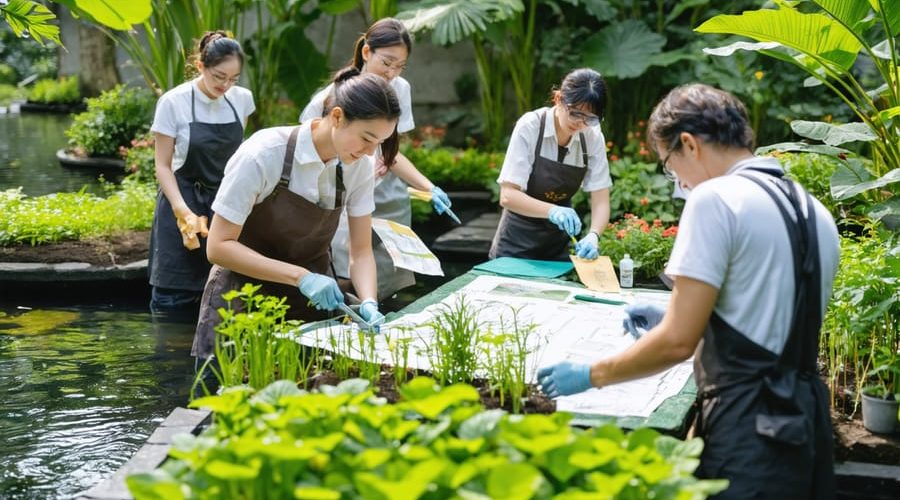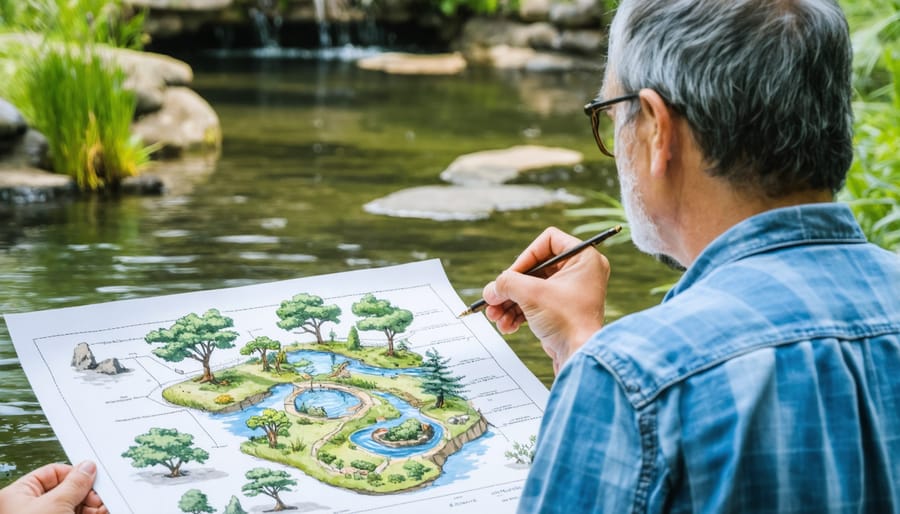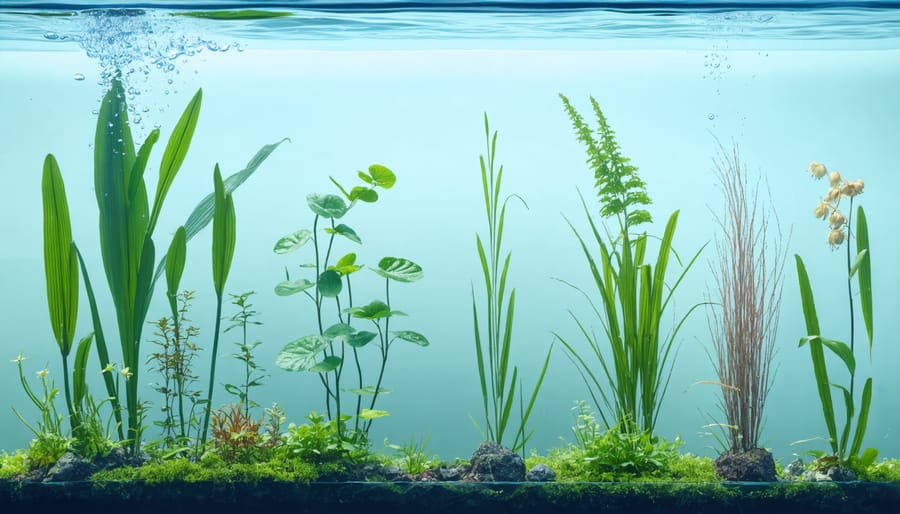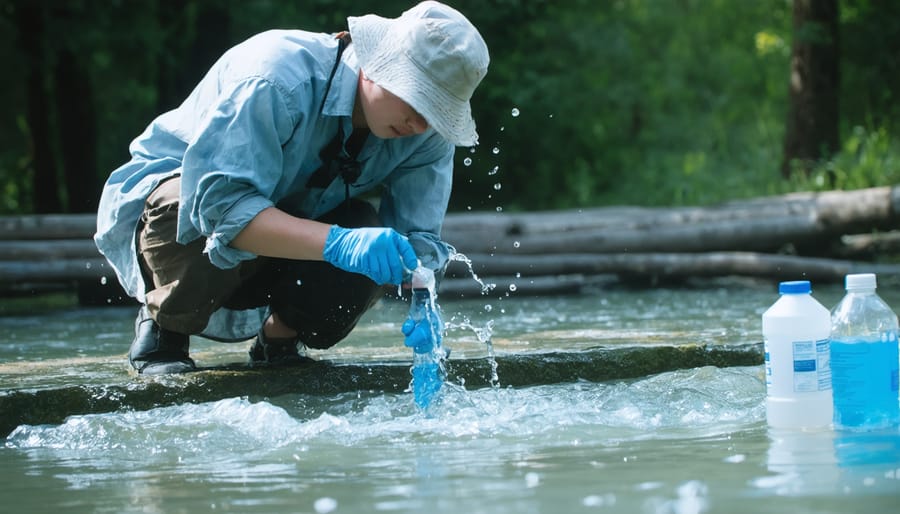
Transform Your Water Garden: Expert Skills You Can Learn in One Afternoon
Transform your garden into a thriving sanctuary through hands-on horticulture workshops that blend practical skills with creative expression. Whether you’re a novice gardener or seasoned enthusiast, these immersive learning experiences offer direct access to expert knowledge and time-tested techniques. From mastering soil composition to creating stunning aquatic environments, workshops provide the perfect blend of theory and practice.
Join a community of passionate gardeners while developing essential skills in plant propagation, sustainable garden design, and seasonal maintenance. Professional horticulturists guide participants through real-world scenarios, offering personalized feedback and practical solutions to common gardening challenges. These interactive sessions empower you to create and maintain beautiful, sustainable gardens while building confidence in your horticultural abilities.
Local workshops connect you with regional expertise, ensuring the techniques you learn are perfectly suited to your climate and growing conditions. With hands-on demonstrations, take-home resources, and ongoing support, these educational experiences provide the foundation for successful gardening projects of any scale.
Essential Water Garden Design Skills
Site Selection and Layout Planning
Choosing the right location for your horticultural activities can make all the difference between thriving plants and constant struggles. Start by observing your space throughout the day to understand sun patterns. Most plants need at least 6 hours of direct sunlight, so note where shadows fall and how they move across your area.
Consider proximity to water sources and electrical outlets – you’ll thank yourself later when you’re not dragging long hoses or extension cords across your yard! The ideal spot should be easily accessible from your home and have good drainage to prevent waterlogging.
When planning your layout, think about workflow efficiency. Create clearly defined paths between different growing areas and ensure there’s enough space to move comfortably with tools and wheelbarrows. Group plants with similar water and sunlight needs together to make maintenance easier.
Don’t forget about wind exposure – strong winds can damage delicate plants and increase water evaporation. If needed, plan for windbreaks like fences or hedges. Also consider your neighbors – ensure tall structures or plants won’t cast unwanted shadows on their property.
For convenience, position your composting area and tool storage nearby but slightly hidden from main view. Remember to leave room for future expansion – many gardeners find their passion growing along with their gardens!

Water Feature Size and Depth Calculations
Calculating the right size and depth for your water feature is crucial for its success and long-term enjoyment. For a small decorative pond, aim for a minimum depth of 18-24 inches to accommodate aquatic plants and protect fish during winter. A good rule of thumb is to allow at least 2 gallons of water per inch of fish length.
For container water gardens, depth requirements are more modest. A water bowl or barrel garden typically needs just 12-15 inches of depth to thrive. When planning larger ponds, consider allocating at least 6-8 feet in width and 8-10 feet in length to create a natural-looking ecosystem.
During our workshops, we teach a simple formula: multiply your desired fish capacity by 2 gallons, then add 30% extra volume for plants and circulation. For example, if you want to keep six 6-inch koi, you’ll need at least 72 gallons (6 fish × 6 inches × 2 gallons), plus 30% more, totaling about 94 gallons.
Remember that bigger is usually better when it comes to water gardens. Larger volumes are more stable and easier to maintain. For waterfalls, plan for a 1-inch drop per foot of stream length to create that perfect sound and movement. We always suggest sketching your design first and using marking paint or rope to outline the shape before digging.
Plant Selection and Care Techniques

Marginal and Deep-Water Plants
In our hands-on workshop sessions, you’ll discover the fascinating world of aquatic plant species that thrive in different water depths. We’ll explore how marginal plants, which grow along the pond’s edge, create a natural transition between your garden and water feature. You’ll learn to identify popular varieties like iris, rushes, and marsh marigolds, and understand their role in maintaining water quality and supporting local wildlife.
Our expert instructors will guide you through the practical aspects of planting and maintaining these water-loving specimens. You’ll get your hands dirty as you practice proper planting techniques, from selecting the right soil mixture to determining ideal water depths for different species. We’ll show you how deep-water plants like water lilies and lotus create stunning focal points while helping to maintain the ecological balance of your pond.
You’ll discover simple tricks for anchoring plants at various depths and learn about seasonal maintenance requirements. We keep things practical with demonstrations of dividing and repotting techniques, plus tips for controlling aggressive spreaders. Throughout the session, we’ll share real-world solutions for common challenges like fluctuating water levels and unwanted algae growth.
By the end of the workshop, you’ll understand how to create distinct planting zones that work together harmoniously. We’ll provide you with a comprehensive plant list and maintenance calendar, ensuring you can confidently care for your water garden throughout the year. Whether you’re starting your first pond or expanding an existing water feature, you’ll leave with the knowledge and hands-on experience needed for success.
Seasonal Plant Management
Throughout the year, our seasonal plant management workshops equip you with essential skills to keep your water garden thriving in every season. In spring, you’ll learn the art of dividing and replanting aquatic plants, identifying early growth signs, and preparing your pond for the active growing season. We’ll show you how to spot and address common spring challenges like algae blooms and how to introduce new plants safely.
Summer workshops focus on maintaining optimal plant health during peak growing season. You’ll discover proper fertilization techniques, learn to manage floating plants that might spread too enthusiastically, and master the balance between sun-loving and shade-seeking species. We’ll also cover water lily care and how to encourage maximum blooming.
As autumn approaches, we shift our attention to preparing plants for cooler weather. You’ll learn which species need to be trimmed back, how to protect tender plants, and the right timing for bringing tropical varieties indoors. The workshops include practical demonstrations of winterizing techniques and creating protective covers for delicate specimens.
Winter sessions emphasize indoor care for tropical water plants and planning for the upcoming season. You’ll discover how to maintain proper humidity levels, provide adequate light, and prevent common winter issues like pest infestations. We’ll also guide you through selecting new varieties for spring and creating a maintenance calendar for the year ahead.
Each season brings its unique challenges and opportunities, and our hands-on approach ensures you’re well-prepared to tackle them all. You’ll leave with confidence in your ability to maintain a vibrant water garden year-round, armed with seasonal checklists and proven maintenance strategies.
Water Quality Management Skills
Testing and Balancing Water Chemistry
Getting your hands dirty with water testing is one of the most exciting parts of our workshops! We’ll teach you how to become a pro at water quality maintenance using simple test kits and easy-to-follow techniques.
During our hands-on sessions, you’ll learn to test for essential parameters like pH, ammonia, nitrites, and nitrates. We make it fun and approachable – no chemistry degree required! You’ll discover how to read test strips accurately, interpret results, and make necessary adjustments to keep your water garden healthy.
We’ll show you the proper way to measure chemicals and add them safely to your pond or water feature. You’ll practice using different testing methods and learn which ones work best for your specific setup. Our instructors will share their favorite tips and tricks for maintaining balanced water chemistry throughout the seasons.
By the end of the workshop, you’ll understand the relationship between water quality and plant health, and how to spot potential issues before they become problems. We’ll also cover natural methods for maintaining water balance, including beneficial bacteria and aquatic plants that help keep your water crystal clear.
Best of all, you’ll leave with a practical testing schedule and maintenance routine that fits your lifestyle, ensuring your water garden stays beautiful year-round.

Filtration System Operation
A well-maintained filtration system is the heart of any healthy water garden. During our workshops, you’ll learn about three essential filtration methods: mechanical, biological, and chemical. Mechanical filtration catches debris like leaves and dirt using various filter media, from basic foam to advanced filter mats. We’ll show you how to select the right filter size for your pond and demonstrate proper cleaning techniques.
Biological filtration, nature’s own cleaning system, relies on beneficial bacteria to break down harmful compounds. You’ll discover how to create the perfect environment for these helpful microorganisms and learn about different bio-media options, from ceramic rings to lava rock. We’ll also cover the importance of maintaining proper water flow through your biological filter.
Chemical filtration, while not always necessary, can be useful in specific situations. We’ll explore when to use activated carbon, zeolite, or other chemical media, and how to integrate them into your existing system. You’ll get hands-on experience maintaining different filter types and troubleshooting common problems.
Our practical sessions include step-by-step filter cleaning demonstrations, seasonal maintenance schedules, and tips for optimizing filter performance. You’ll learn how to recognize signs that your filtration system needs attention and how to make adjustments for changing seasons. We keep things simple and practical, ensuring you’ll leave confident in your ability to maintain crystal-clear pond water.
Finding and Choosing the Right Workshop
Finding the perfect horticulture workshop starts with understanding your own goals and current skill level. Whether you’re a complete beginner or someone looking to expand their knowledge of professional aquatic systems, there’s a workshop out there for you.
Begin by asking yourself what specific aspects of horticulture interest you most. Are you drawn to water gardens, sustainable practices, or perhaps specialized plant cultivation? Many workshops offer focused learning experiences in these areas, allowing you to dive deep into your preferred topic.
Consider these key factors when selecting a workshop:
Experience Level: Look for clear descriptions of who the workshop is designed for. Some might say “beginner-friendly” or “advanced techniques,” helping you choose one that matches your knowledge base.
Class Size: Smaller groups often mean more individual attention and hands-on practice. Larger workshops might be more lecture-based but could offer networking opportunities.
Duration and Schedule: Weekend intensives might suit busy professionals, while weekly sessions allow time to practice between classes.
Location and Format: Some workshops offer online components combined with practical sessions. Consider travel time and accessibility when choosing an in-person workshop.
Reviews and Recommendations: Look for testimonials from past participants or ask local gardening groups for suggestions. Personal experiences can provide valuable insights into the workshop’s quality and teaching style.
Cost and Value: Compare prices, but remember that cheaper isn’t always better. Consider what’s included – materials, tools, take-home plants, or ongoing support might justify a higher fee.
Don’t hesitate to contact workshop organizers with questions. Most are happy to help you determine if their program matches your needs and can provide additional details about their teaching approach and expected outcomes.
Participating in horticulture workshops can be a transformative experience that enriches both your garden and your life. Through hands-on learning and expert guidance, you’ll gain confidence in your gardening abilities while connecting with like-minded enthusiasts who share your passion for plants and outdoor spaces.
The skills you’ll acquire extend far beyond basic plant care. You’ll learn sustainable gardening practices, develop problem-solving abilities, and understand the intricate relationships between plants, soil, and local ecosystems. These workshops provide a solid foundation for creating beautiful, thriving gardens while being mindful of environmental impact.
Ready to start your workshop journey? Begin by identifying your specific interests and gardening goals. Whether you’re drawn to vegetable gardening, flower arranging, or landscape design, there’s a workshop perfectly suited to your needs. Check local garden centers, botanical gardens, and community centers for upcoming sessions, and don’t hesitate to reach out to organizers with questions about class size and skill requirements.
Remember, every expert gardener started as a beginner. By taking that first step to register for a workshop, you’re joining a supportive community of garden enthusiasts eager to share their knowledge and experiences. The connections you make and skills you develop will continue to grow long after the workshop ends, making your gardening journey more rewarding and enjoyable.
